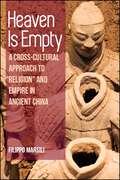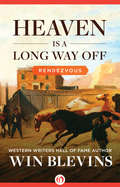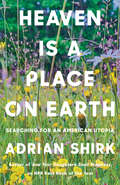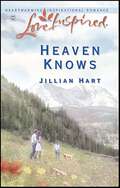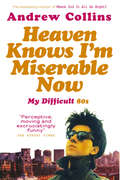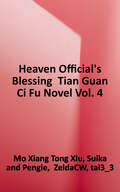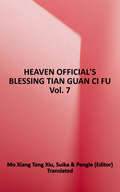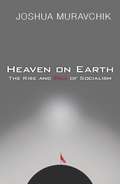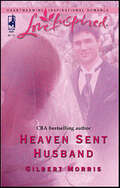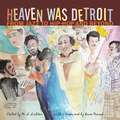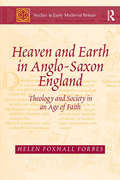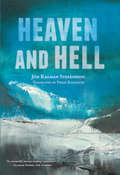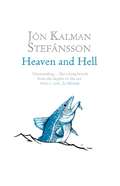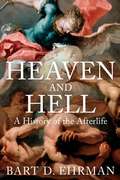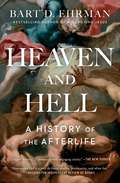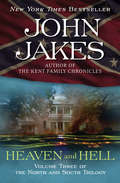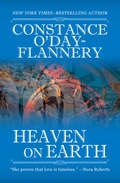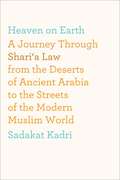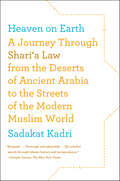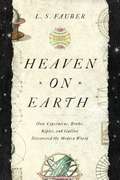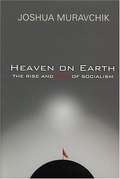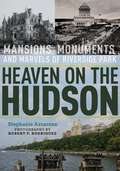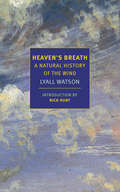- Table View
- List View
Heaven Is Empty: A Cross-Cultural Approach to "Religion" and Empire in Ancient China (SUNY series in Chinese Philosophy and Culture)
by Filippo MarsiliHeaven Is Empty offers a new comparative perspective on the role of the sacred in the formation of China's early empires (221 BCE–9 CE) and shows how the unification of the Central States was possible without a unitary and universalistic conception of religion. The cohesive function of the ancient Mediterranean cult of the divinized ruler was crucial for the legitimization of Rome's empire across geographical and social boundaries. Eventually reelaborated in Christian terms, it came to embody the timelessness and universality of Western conceptions of legitimate authority, while representing an analytical template for studying other ancient empires. Filippo Marsili challenges such approaches in his examination of the reign of Emperor Wu of the Han (141–87 BCE). Wu purposely drew from regional traditions and tried to gain the support of local communities through his patronage of local cults. He was interested in rituals that envisioned the monarch as a military leader, who directly controlled the land and its resources, as a means for legitimizing radical administrative and economic centralization. In reconstructing this imperial model, Marsili reinterprets fragmentary official accounts in light of material evidence and noncanonical and recently excavated texts. In bringing to life the courts, battlefields, markets, shrines, and pleasure quarters of early imperial China, Heaven Is Empty provides a postmodern and postcolonial reassessment of "religion" before the arrival of Buddhism and challenges the application of Greco-Roman and Abrahamic systemic, identitary, and exclusionary notions of the "sacred" to the analysis of pre-Christian and non-Western realities.
Heaven Is a Long Way Off
by Win BlevinsThe fourth installment of the Rendezvous series, from award-winning author Win Blevins When Jebediah Smith's party of roving fur trappers is expelled from the Mexican territory of California, Sam Morgan is off for another adventure in this fourth installment of Win Blevins' Rendezvous series. The plucky Morgan, though tougher and wiser as a result of his experiences, is devastated when his Crow wife (Meadowlark) dies in childbirth. He is forced to leave his daughter Esperanza behind as the party travels to the adobe missions of Santa Fe. When a ravishing widow (Dona Paloma) falls for Sam, things begin to get sticky as Morgan makes plans to reclaim his daughter, only to learn that she has been kidnapped. Reclaiming Esperanza--and returning her to Wind River--becomes the greatest challenge of young Morgan's life. Rendered in gripping prose, Heaven Is a Long Way Off is an excellent addition to this thoroughly admirable Western series. Readers of Blevins will enjoy his careful look at group politics and race relations, which often finds his characters on the wrong end of a gun. His supporting research is fine, and historians of the period will recognize some of their favorite characters--Joe Meek, Kit Carson, Jim Bridger--in this motley band of resourceful (if uncouth) mountain men.
Heaven Is a Place on Earth: Searching for an American Utopia
by Adrian ShirkAn exploration of American ideas of utopia through the lens of one millennial's quest to live a more communal life under late-stage capitalismTold in a series of essays that balance memoir with fieldwork, Heaven Is a Place on Earth is an idiosyncratic study of American utopian experiments—from the Shakers to the radical faerie communes of Short Mountain to the Bronx rebuilding movement—through the lens of one woman&’s quest to create a more communal life in a time of unending economic and social precarity. When Adrian Shirk&’s father-in-law has a stroke and loses his ability to speak and walk, she and her husband—both adjuncts in their midtwenties—become his primary caretakers. The stress of these new responsibilities, coupled with navigating America&’s broken health-care system and ordinary twenty-first-century financial insecurity, propels Shirk into an odyssey through the history and present of American utopian experiments in the hope that they might offer a way forward. Along the way, Shirk seeks solace in her own community of friends, artists, and theologians. They try to imagine a different kind of life, examining what might be replicable within the histories of utopia-making, and what might be doomed. Rather than &“no place,&” Shirk reframes utopia as something that, according to the laws of capital and conquest, shouldn&’t be able to exist—but does anyway, if only for a moment.
Heaven Knows
by Jillian HartTrusting the Lord to guide her to safety, Alexandra Sims traveled across Montana, never expecting to find the love and family she'd always craved. Good things like that didn't just happen-they were gifts from God. Alexandra trusted John Corey's loving smile and agreed to be his adorable daughter's nanny...at least, until John discovered Alexandra's painful secret.John Corey led a modest life with his daughter and silently grieved his wife's death. One day, a beautiful drifter wandered into his life and turned it around. Suddenly, John believed in love again and put his faith in Alexandra. Though she hid her secret past, he wanted to bring her peace and show her how much he cared....
Heaven Knows I'm Miserable Now: My Difficult 80s
by Andrew Collins'Higher education comes at exactly the right time: in the twilight of your teens, you're just starting to coagulate as a human being, to pull away from parental influence and find your own feet. What better than three years in which to explore the inner you, establish a feasible worldview, and maybe get on Blockbusters.'After an idyllic provincial 1970s childhood, the 1980s took Andrew Collins to London, art school and the classic student experience. Crimping his hair, casting aside his socks and sporting fingerless gloves, he became Andy Kollins: purveyor of awful poetry; disciple of moany music, and wannabe political activist. What follows is a universal tale of trainee hedonism, girl trouble, wasted grants and begging letters to parents. A synth-soundtracked rite of passage that's often painfully funny, it traces one teenager's metamorphosis from sheltered suburban innocent to semi-mature metropolitan male through the pretensions and confusions of trying to stand alone for the first time in your own kung fu pumps in a big bad city.
Heaven Official's Blessing: Tian Guan Ci Fu (Heaven Official's Blessing: Tian Guan Ci Fu (novel) Ser. #4)
by Mo Xiang Tong XiuFates Aligned, Bodies Intertwined The Reverend of Empty Words, a monster that feeds off the fears of the fortunate, is hunting Xie Lian's friend, the Wind Master Shi Qingxuan. Knowing that his abysmal luck inoculates him from the creature's power, Xie Lian doesn't hesitate to throw himself into harm's way--to Hua Cheng's horror and panic. But another one of the Four Calamities may be closer than anyone knows, and even a ghost as powerful as Hua Cheng can lose control under the right circumstances. With his inhibitions gone, will desire overtake him?
Heaven Official's Blessing: Tian Guan Ci Fu (Heaven Official's Blessing: Tian Guan Ci Fu (novel) Ser. #7)
by Mo Xiang Tong XiuLifetimes of Cruelty, Centuries of Devotion The Kiln is open, and White No-Face is back to his full power. The past eight hundred years have not blunted his hatred nor his obsession with Xie Lian--he aims to break Xie Lian down to nothing, even if all of humanity and the heavens themselves are collateral damage. This time, however, Xie Lian will not face him alone. Together with Hua Cheng--powerful ghost king, stalwart protector, and devoted love--can Xie Lian finally reveal the face behind the mask and put an end to the nightmare forever?
Heaven On Earth
by Joshua Muravchik"Socialism was man's most ambitious attempt to supplant religion with a doctrine claiming to ground itself in "science." Indeed, no religion ever spread so far so fast. Yet while socialism had established itself as a fact of life by the beginning of the 20th century, it did not create societies of abundance or give birth to "the New Man." Each failure inspired new searches for the path to the promised land: revolution, communes, social democracy, Communism, Fascism, Third World socialism. None worked, and some exacted staggering human tolls. Then, after two hundred years of wishful thinking and fitful governance, socialism suddenly imploded in a fin du siecle drama of falling walls and collapsing regimes.In Heaven on Earth, Joshua Muravchik traces this fiery trajectory through sketches of the thinkers and leaders who developed the theory, led it to power, and presided over its collapse. We see such dreamers and doers as the French revolutionary Gracchus Babeuf, whose "Conspiracy of Equals" were the first to try to outlaw private property; Robert Owen, who hoped to plant a model socialist utopia in the United States; Friedrich Engels, who created the cult of Karl Marx and "scientific" socialism; Benito Mussolini, self proclaimed socialist heretic and inventor of Fascism; Clement Attlee, who rejected the fanatics and set out to build socialism democratically in Britain; Julius Nyerere, who merged social democracy and communism in the hope of making Tanzania a model for the developing world; and Mikhail Gorbachev, Deng Xiaoping and Tony Blair, who became socialism's inadvertent undertakers.Muravchik's accomplishment in Heaven on Earth is to tell a story filled with character and event while at the same time giving us an epic chronicle of a movement that tried to turn the world upside down-and for a time succeeded."
Heaven Sent Husband
by Gilbert MorrisBetween her dedicated nursing at Mercy Hospital and plans to be a missionary in India, Ketura Lindsey had no time to think about marriage. But to follow God’s plan, she had to acknowledge that love was part of His higher purpose for her life. Yet did He really intend her to find wedded bliss with her high school nemesis, Jared Pierce?Jared, the star of the baseball team, had hurt tall, gangly Ket with his teasing. Now an intern at Mercy, he was a constant presence in her heart and mind. But would Jared, who dated beauty queens, ever notice—let alone propose to—a plain Jane?
Heaven Was Detroit: From Jazz to Hip-Hop and Beyond
by Dave Marsh Edited by M. L. LieblerHeaven Was Detroit: From Jazz to Hip Hop and Beyond is the first of its kind to capture the full spectrum of Detroit popular music from the early 1900s to the twenty-first century. Readers will find in this unique and stimulating anthology new essays, and a few classics, by widely known and respected music writers, critics, and recording artists who weigh in on their careers and experiences in the Detroit music scene, from rock to jazz and everything in between. With a foreword by the acclaimed rock writer Dave Marsh and iconic photos by Leni Sinclair, the book features such well-known writers as Greil Marcus, Jaan Uhelszki, Al Young, Susan Whitall, Gary Graff, John Sinclair, and many others. Divided into nine sections, the book moves chronologically through the early days of jazz in Detroit, to the rock ’n’ roll of the 1960s, and up to today’s electronica scene, with so many groundbreaking moments in between. This collection of cohesive essays includes Motown’s connection to the Civil Rights Movement and the Black Power Movement through its side label, Black Forum Records; Lester Bangs’s exemplary piece on Alice Cooper; the story behind the emergence of rap legend Eminem; and Craig Maki’s enlightening history on “hillbilly rock” — just to name a few. With a rich musical tradition to rival Nashville, Detroit serves as the inspiration, backdrop, and playground for some of the most influential music artists of the past century. Heaven Was Detroit captures the essence of the Detroit music scene: the grit, the spark, the desire to tell a story set to the rhythm of the city. Fans of any music genre will find something that speaks to them in the pages of this collection.
Heaven and Earth in Anglo-Saxon England: Theology and Society in an Age of Faith (Studies in Early Medieval Britain and Ireland)
by Helen Foxhall ForbesChristian theology and religious belief were crucially important to Anglo-Saxon society, and are manifest in the surviving textual, visual and material evidence. This is the first full-length study investigating how Christian theology and religious beliefs permeated society and underpinned social values in early medieval England. The influence of the early medieval Church as an institution is widely acknowledged, but Christian theology itself is generally considered to have been accessible only to a small educated elite. This book shows that theology had a much greater and more significant impact than has been recognised. An examination of theology in its social context, and how it was bound up with local authorities and powers, reveals a much more subtle interpretation of secular processes, and shows how theological debate affected the ways that religious and lay individuals lived and died. This was not a one-way flow, however: this book also examines how social and cultural practices and interests affected the development of theology in Anglo-Saxon England, and how ’popular’ belief interacted with literary and academic traditions. Through case-studies, this book explores how theological debate and discussion affected the personal perspectives of Christian Anglo-Saxons, including where possible those who could not read. In all of these, it is clear that theology was not detached from society or from the experiences of lay people, but formed an essential constituent part.
Heaven and Hell
by Phil Roughton Jon Kalman StefanssonJón Kalman Stefánsson is the winner of the Icelandic Prize for Literature and has been nominated three times for the Nordic Council Prize for Literature. Heaven and Hell, is a perfectly formed, vivid and timeless story, lyrical in style, and as intense a reading experience as the forces of the Icelandic landscape themselves. Der Spiegel said it was "like an oyster--a glinting treasure in a rough shell." In a remote part of Iceland, a boy and his friend Barður join a boat to fish for cod. A winter storm surprises them out at sea and Barður, absorbed in "Paradise Lost", succumbs to the ferocious cold and dies. Distraught from the murky circumstances of Barður's death, the boy leaves the village, intending to return the book to its original owner. The extreme hardship and danger of the journey is of little consequence to him--he has already resolved to join his friend in death. But once in the town he immerses himself in the stories and lives of its inhabitants, and decides that he cannot be with his friend just yet.
Heaven and Hell
by Jón Kalman StefánssonIn a remote part of Iceland, a boy and his friend Barður join a boat to fish for cod. A winter storm surprises them out at sea and Barður, who has forgotten his waterproof as he was too absorbed in 'Paradise Lost', succumbs to the ferocious cold and dies. Appalled by the death and by the fishermen's callous ability to set about gutting the fatal catch, the boy leaves the village, intending to return the book to its owner. The extreme hardship and danger of the journey is of little consequence to him - he has already resolved to join his friend in death. But once in the town he immerses himself in the stories and lives of its inhabitants, and decides that he cannot be with his friend just yet. Set at the turn of the twentieth century, Heaven and Hell is a perfectly formed, vivid and timeless story, lyrical in style, and as intense a reading experience as the forces of the Icelandic landscape themselves. An outstandingly moving novel.
Heaven and Hell
by Jón Kalman StefánssonIn a remote part of Iceland, a boy and his friend Barður join a boat to fish for cod. A winter storm surprises them out at sea and Barður, who has forgotten his waterproof as he was too absorbed in 'Paradise Lost', succumbs to the ferocious cold and dies. Appalled by the death and by the fishermen's callous ability to set about gutting the fatal catch, the boy leaves the village, intending to return the book to its owner. The extreme hardship and danger of the journey is of little consequence to him - he has already resolved to join his friend in death. But once in the town he immerses himself in the stories and lives of its inhabitants, and decides that he cannot be with his friend just yet. Set at the turn of the twentieth century, Heaven and Hell is a perfectly formed, vivid and timeless story, lyrical in style, and as intense a reading experience as the forces of the Icelandic landscape themselves. An outstandingly moving novel.
Heaven and Hell: A History of the Afterlife
by Bart D. EhrmanWhere did the ideas of heaven and hell come from? 'An engaging but expert guide.' THE TIMES As strange as it may seem to us now, there was a time when no one thought they would go to heaven or hell after they died. In fact, there is no mention of them in the Old Testament, and Jesus did not believe the souls of the departed were bound for either realm. In this gripping history of the afterlife, Bart Ehrman reveals how the concepts of heaven and hell developed and took hold, and why they endure to this day. He examines the social, cultural and historical roots of competing views held by Greeks, Jews and Christians, and traces how beliefs changed over time. Ultimately, he shows that many of our ideas about heaven and hell emerged long after Jesus&’s time, through the struggle to explain the injustices of the world. *** 'There&’s no one I&’d rather read on what Christians believe, and why they believe it, than Bart Ehrman.' TOM BISSELL, AUTHOR OF APOSTLE 'An impressively readable, clear and wide-ranging study.' SPECTATOR 'This elegant history explores the evolution of the concept of the afterlife in Western thought... presented with engaging clarity.' THE NEW YORKER
Heaven and Hell: A History of the Afterlife
by Bart EhrmanA New York Times bestselling historian of early Christianity takes on two of the most gripping questions of human existence: where did the ideas of heaven and hell come from, and why do they endure? <P><P>What happens when we die? A recent Pew Research poll showed that 72% of Americans believe in a literal heaven, 58% in a literal hell. Most people who hold these beliefs are Christian and assume they are the age-old teachings of the Bible. But eternal rewards and punishments are found nowhere in the Old Testament and are not what Jesus or his disciples taught. So where did the ideas come from? <P><P>In clear and compelling terms, Bart Ehrman recounts the long history of the afterlife, ranging from The Epic of Gilgamesh up to the writings of Augustine, focusing especially on the teachings of Jesus and his early followers. He discusses ancient guided tours of heaven and hell, in which a living person observes the sublime blessings of heaven for those who are saved and the horrifying torments of hell for the damned. Some of these accounts take the form of near death experiences, the oldest on record, with intriguing similarities to those reported today. <P><P> One of Ehrman’s startling conclusions is that there never was a single Greek, Jewish, or Christian understanding of the afterlife, but numerous competing views. Moreover, these views did not come from nowhere; they were intimately connected with the social, cultural, and historical worlds out of which they emerged. Only later, in the early Christian centuries, did they develop into the notions of eternal bliss or damnation widely accepted today. <P><P> As a historian, Ehrman obviously cannot provide a definitive answer to the question of what happens after death. In Heaven and Hell, he does the next best thing: by helping us reflect on where our ideas of the afterlife come from, he assures us that even if there may be something to hope for when we die, there is certainly nothing to fear.
Heaven and Hell: North And South, Love And War, And Heaven And Hell (The North and South Trilogy #3)
by John JakesThe searing conclusion to the North and South Trilogy brings the battle between the Mains and Hazards—and Confederate and Union armies—to a brilliantly satisfying end The last days of the Civil War bring no peace for the Main and Hazard families. As the Mains&’ South smolders in the ruins of defeat, the Hazards&’ North pushes blindly for relentless industrial progress. Both the nation and the families&’ long-standing bond hover on the brink of destruction. In the series&’ epic conclusion, Jakes expertly blends personal conflict with historical events, crafting a haunting page-turner about America&’s constant change and unyielding hope. This ebook features an illustrated biography of John Jakes including rare images from the author&’s personal collection.
Heaven in a Wildflower
by Patricia Hagan"…light banter and easy camaraderie yielded to hungry desire and smoldering passion. Neither knew where their reckless emotions would lead, for there was no thought of tomorrow, only the here and now and the joy of each tender moment."—New Orleans and London, 1858 - 1865—Their love began in the mystical Louisiana Bayou, the beautiful Anjele Sinclair—born into southern wealth--and the mysterious, handsome Cajun known only as Gator. But the passion and joy they found in the secret darkness of the Bayou was forbidden.When Anjele's father discovers the illicit relationship, a lie is concocted to make Anjele believe Gator has been unfaithful with another woman. Infuriated and embarrassed, Anjele agrees to go to England for schooling, eager to forget being played for a fool.Four years later, she returns to Louisiana amid a time of southern turmoil and witnesses her father's brutal murder and the destruction of her home. Blinded by a blow to her head, Anjele is floundering in despair, until a man named Brett Cody comes to her aid.Anjele falls in love with the benevolent stranger. But when Anjele's eyesight returns, it's with mingled joy and anger over finding herself in the arms of the one man she'd taught herself to hate.Publisher Note: Patricia Hagan writes impeccable historical romance, transporting readers to a world of strong men, vibrant women, and unabashed passion.Don't miss these other titles from Patricia Hagan:Say You Love Me (A Historical Western Romance)Forbidden to Love (Author's Cut Edition)Passion's Fury (Author's Cut Edition)This Rebel Heart (The Souls Aflame Series, Book 1)This Savage Heart (The Souls Aflame Series, Book 2)Simply HeavenOrchids in MoonlightStarlightFinal Justice
Heaven on Earth (Avon Romance Ser.)
by Constance O'Day-FlanneryA journey into the past. An angelic hero. A divine romance from the New York Times–bestselling author who &“proves that love is timeless&” (Nora Roberts). Working in the accounting department of a large soap manufacturer isn&’t exactly where Casey O&’Reilly saw her life as going. She had always pictured something more glamorous, more exciting. But, she never pictured something so exciting as time travel. A freak lightning strike near Sante Fe somehow sends Casey back to the year 1878. Thrown into vibrant yet unfamiliar past, Casey finds herself lost and alone. That is, until a mysterious man named Luke arrives, claiming to be a time traveler himself. He wants to guide Casey on her journey, even arranging for her to be the guest of an aristocratic Hispanic family. Will Casey be able to handle the shock of traveling back in time? Will she finally take control of her life and realize that love is staring her right in the face? In Heaven on Earth, Constance O&’Day-Flannery, the original &“Queen of Time Travel Romance,&” shows readers that true love can lead us toward our destinies... even if those destinies are lifetimes apart.
Heaven on Earth: A Journey Through Shari'a Law from the Deserts of Ancient Arabia to the Streets of the Modern Muslim World
by Sadakat KadriSome fourteen hundred years after the Prophet Muhammad first articulated God's law--the shari'a--its earthly interpreters are still arguing about what it means. Hard-liners reduce it to amputations, veiling, holy war, and stonings. Others say that it is humanity's only guarantee of a just society. And as colossal acts of terrorism made the word "shari'a" more controversial than ever during the past decade, the legal historian and human rights lawyer Sadakat Kadri realized that many people in the West harbored ideas about Islamic law that were hazy or simply wrong. Heaven on Earth describes his journey, through ancient texts and across modern borders, in search of the facts behind the myths. Kadri brings lucid analysis and enlivening wit to the turbulent story of Islam's foundation and expansion, showing how the Prophet Muhammad's teachings evolved gradually into concepts of justice. Traveling the Muslim world to see the shari'a's principles in action, he encounters a cacophony of legal claims. At the ancient Indian grave of his Sufi ancestor, unruly jinns are exorcised in the name of the shari'a. In Pakistan's madrasas, stern scholars ridicule his talk of human rights and demand explanations for NATO drone attacks in Afghanistan. In Iran, he hears that God is forgiving enough to subsidize sex-change operations--but requires the execution of Muslims who change religion. Yet the stories of compulsion and violence are only part of a picture that also emphasizes compassion and equity. Many of Islam's first judges refused even to rule on cases for fear that a mistake would damn them, and scholars from Delhi to Cairo maintain that governments have no business enforcing faith. The shari'a continues to shape explosive political events and the daily lives of more than a billion Muslims. Heaven on Earth is a brilliantly iconoclastic tour through one of humanity's great collective intellectual achievements--and an essential guide to one of the most disputed but least understood controversies of modern times. Sadakat Kadri is a practicing English barrister and qualified New York attorney, and the author of The Trial. He has a master's degree from Harvard Law School and has contributed to The Guardian, The Times (London), and the London Review of Books, and he is the winner of the 1998 Shiva Naipaul Memorial Prize for travel writing. He lives in London.
Heaven on Earth: A Journey Through Shari'a Law from the Deserts of Ancient Arabia to the Streets of the Modern Muslim World
by Sadakat KadriHeaven on Earth is a vivid, revealing, and essential narrative history of shari'a law--the widely contested and misunderstood code of Islamic justice--and how the application of its concepts has changed over time and, with it, the face of Islam.Some fourteen hundred years after the Prophet Muhammad first articulated God's law--the shari'a--its earthly interpreters are still arguing about what it means. Hard-liners reduce it to amputations, veiling, holy war, and stonings. Others say that it is humanity's only guarantee of a just society. And as colossal acts of terrorism made the word "shari'a" more controversial than ever in the early twentieth century, the legal historian and human rights lawyer Sadakat Kadri realized that many people in the West harbored ideas about Islamic law that were hazy or simply wrong. Heaven on Earth describes his journey, through ancient texts and across modern borders, in search of the facts behind the myths.Kadri brings lucid analysis and enlivening wit to the turbulent story of Islam's foundation and expansion, showing how the Prophet Muhammad's teachings evolved gradually into concepts of justice. Traveling the Muslim world to see the shari'a's principles in action, he encounters a cacophony of legal claims. At the ancient Indian grave of his Sufi ancestor, unruly jinns are exorcised in the name of the shari'a. In Pakistan's madrasas, stern scholars ridicule his talk of human rights and demand explanations for NATO drone attacks in Afghanistan. In Iran, he hears that God is forgiving enough to subsidize sex-change operations--but requires the execution of Muslims who change religion. Yet the stories of compulsion and violence are only part of a picture that also emphasizes compassion and equity. Many of Islam's first judges refused even to rule on cases for fear that a mistake would damn them, and scholars from Delhi to Cairo maintain that governments have no business enforcing faith.The shari'a continues to shape explosive political events and the daily lives of more than a billion Muslims. Heaven on Earth is a brilliantly iconoclastic tour through one of humanity's great collective intellectual achievements--and an essential guide to one of the most disputed but least understood controversies of modern times.
Heaven on Earth: How Copernicus, Brahe, Kepler, And Galileo Discovered The Modern World
by L. S. FauberA vivid narrative that connects the lives of four great astronomers as they discovered, refined, and popularized the first major scientific discovery of the modern era: that the Earth moves around the Sun. Today we take for granted that a telescope allows us to see galaxies millions of light years away. But before its invention, people used nothing more than their naked eye to fathom what took place in the visible sky. So how did four men in the 1500's—of different nationality, age, religion, and class—collaborate to discover that the Earth revolved around the Sun? With this radical discovery that went against the Church, they created our contemporary world—and with it, the uneasy conditions of modern life. Heaven on Earth is an intimate examination of this scientific family—that of Nicolaus Copernicus, Tycho Brahe, Johannes Kepler, and Galileo Galilei. Fauber juxtaposes their scientific work with insight into their personal lives and political considerations, which shaped their pursuit of knowledge. Uniquely, he shows how their intergenerational collaboration was actually what made the scientific revolution possible. Ranging from the birth of astronomy and the methods of early scientific research, Fauber reveals the human story that underlies this civilization altering discovery. And, contrary to the competitive nature of research today, collaboration was key to early scientific discovery. Before the rise of university research institutions, deep thinkers only had each other. They created a kind of family, related to each other via intellectual pursuit rather than blood. These men called each other “brothers,” “fathers,” and “sons,” and laid the foundations of modern science through familial co-work. And though the sixteenth century was far from the an open society for women, There were female pioneers in this “family” as well, including Brahe's sister Sophie, Kepler’s mother, and Galileo's daughter. Filled with rich characters and sweeping historical scope, Heaven on Earth reveals how the strong connections between these pillars of intellectual history moved science forward—and how, without them, we might have waited a long time for a heliocentric model of the universe.
Heaven on Earth: The Rise and Fall of Socialism
by Joshua MuravchikIn this book, the author traces the fiery trajectory through portraits of the thinkers and leaders who developed the theory of socialism, led it to power and presided over its collapse. We see such dreamers and doers as the French Revolutionary Gracchus Babeuf, whose "Conspiracy of Equals" was the first to try to outlaw private property; Robert Owen, who hoped to plant a model socialist utopia in the U.S., and many others up to Tony Blair, who became one of socialisms inadvertent undertakers.
Heaven on the Hudson: Mansions, Monuments, and Marvels of Riverside Park
by Stephanie AzzaroneWinner, Victorian Society in America Book AwardA colorful tale of a singular New York City neighborhood and the personalities who make it specialTo outsiders or East Siders, Riverside Park and Riverside Drive may not have the star status of Fifth Avenue or Central Park West. But at the city’s westernmost edge, there is a quiet and beauty like nowhere else in all of New York. There are miles of mansions and monuments, acres of flora, and a breadth of wildlife ranging from Peregrine falcons to goats. It’s where the Gershwins and Babe Ruth once lived, William Randolph Hearst ensconced his paramour, and Amy Schumer owns a penthouse. Told in the uniquely personal voice of a longtime resident, Heaven on the Hudson is the only New York City book that features the history, architecture, and personalities of this often overlooked neighborhood, from the eighteenth century through the present day.Combining an extensively researched history of the area and its people with an engaging one-on-one guide to its sights, author Stephanie Azzarone sheds new light on the initial development of Riverside Park and Riverside Drive, the challenges encountered—from massive boulders to “maniacs”—and the reasons why Riverside Drive never became the “new Fifth Avenue” that promoters anticipated. From grand “country seats” to squatter settlements to multi-million-dollar residences, the book follows the neighborhood’s roller-coaster highs and lows over time. Readers will discover a trove of architectural and recreational highlights and hidden gems, including the Drive’s only freestanding privately owned villa, a tomb that’s not a tomb, and a sweet memorial to an eighteenth-century child. Azzarone also tells the stories behind Riverside’s notable and forgotten residents, including celebrities, murderers, a nineteenth-century female MD who launched the country’s first anti-noise campaign, and an Irish merchant who caused a scandal by living with an Indian princess.While much has been written about Central Park, little has focused exclusively on Riverside Drive and Riverside Park until now. Heaven on the Hudson is dedicated to sharing this West Side neighborhood’s most special secrets, the ones that, without fail, bring both pleasure and peace in a city of more than 8 million.
Heaven's Breath: A Natural History of the Wind
by Lyall WatsonWind is everywhere and nowhere. Wind is the circulatory system of the earth, and its nervous system, too. Energy and information flow through it. It brings warmth and water, enriches and strips away the soil, aerates the globe. Wind shapes the lives of animals, humans among them. Trade follows the path of the wind, as empire also does. Wind made the difference in wars between the Greeks and Persians, the Mongols and the Japanese. Wind helped to destroy the Spanish Armada. And wind is no less determining of our inner lives: the föhn, mistral, sirocco, Santa Ana, and other “ill winds” of the world are correlated with disease, suicide, and even murder.Heaven’s Breath is an encyclopedic and enchanting book that opens dazzling new perspectives on history, nature, and humanity.
